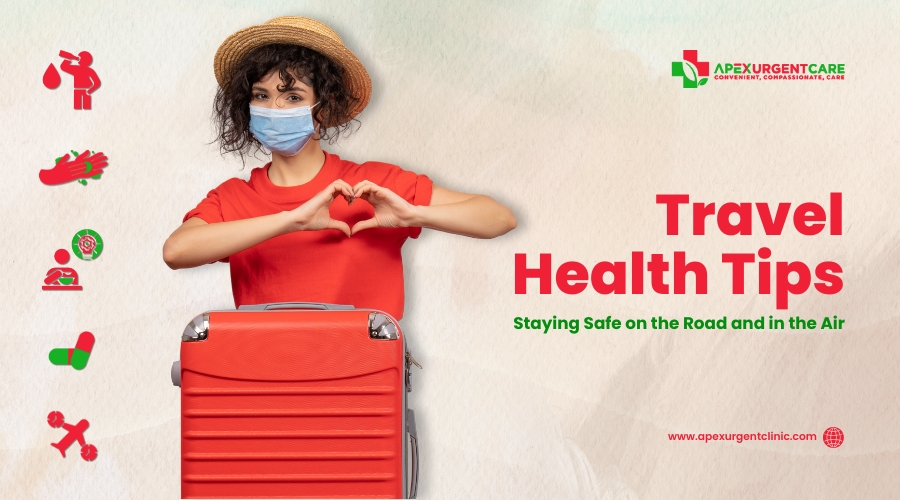
Traveling, whether for the holidays or a vacation, can be exciting but can also pose risks to the health. Ensuring you stay hydrated, healthy, and stress-free during your journey is essential for a pleasant trip. With precautions, you can avoid common travel-related health issues and know when to seek medical care if something goes wrong.
Staying Healthy While Traveling
Stay Hydrated:
Drink plenty of water during air travel because cabin air can cause dehydration.
Avoid excessive caffeine or alcohol, which dehydrates you.
Carry a reusable water bottle to refill throughout.
Maintain Hand Hygiene:
Keep hand sanitizer (with at least 60% alcohol) and disinfectant wipes handy.
Wash hands thoroughly with soap and water before eating, after using the restroom, and touching high-contact surfaces like airplane trays or hotel doorknobs.
Eat Smart:
Avoid consuming raw or undercooked foods when traveling.
Stick to bottled water if you are unsure about local water quality.
Pack healthy snacks like nuts, granola bars, or fruits to avoid roadside fast food.
Prepare Medications:
Keep prescription medications in your carry-on luggage for easy access.
Pack over-the-counter remedies for headaches, motion sickness, or upset stomachs.
Manage Jet Lag:
Adjust your sleep schedule before your trip.
Stay awake and active upon arrival to reset your internal clock.
Use natural light exposure to help your body adjust.
Common Travel-Related Health Issues
- Motion Sickness: Symptoms include dizziness, nausea, and vomiting during travel by car, boat, or plane. Over-the-counter medications like dimenhydrinate (Dramamine) reduce motion sickness.
- Dehydration: Long flights or hot climates lead to dehydration, which can cause headaches, dizziness, or fatigue. Drink water regularly and avoid diuretics like caffeine.
- Respiratory Infections: Airplanes and crowded places increase exposure to germs. Wearing a mask and practicing good hygiene can minimize risk.
- Traveler’s Diarrhea: Often caused by consuming contaminated food or water, this can disrupt your trip. Use oral rehydration solutions and stick to safe eating practices.
Stress and Its Impact on Travel Health
Stress from planning, packing, and navigating unfamiliar environments can take a toll on your body.
High-stress levels:
- Suppress your immune system, making you susceptible to illnesses.
- Trigger headaches or migraines.
- It causes digestive issues like stomach cramps or nausea.
When to Visit Urgent Care
While travel-related issues are minor, some symptoms require prompt medical attention.
Visit Apex Urgent Care Clinic if you experience:
- Severe Dehydration: Signs include extreme thirst, dark urine, or dizziness.
- Problems in breathing, chest pain, or a prolonged cough after a flight.
- Severe vomiting or diarrhea lasting 48 hours or signs of dehydration.
- Cuts, burns, or infections that worsen during your trip.
- High Fever or Rash indicates conditions like malaria or dengue fever.
Take Charge of Your Health with Apex Clinic
Traveling should be an enjoyable experience, not a source of illness or stress. Make the most of your journey by staying prepared and knowing when to seek help. If you encounter health issues while traveling, Apex Urgent Care Clinic is here to provide professional care and guidance. Our doctor can address your concerns and help you recover. Safe travels!

